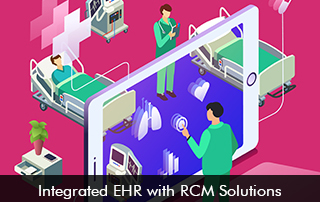To stay on top of performance goals it has become highly critical for independent and private practices to implement an integrated Electronic Medical Records (EMR) Software system. The integrated EHR has revenue cycle management solutions that greatly streamline tedious processes to boost efficiency levels.
According to a study by the Physicians Advocacy Institute, 100,000 clinicians abandoned private practice and became employees. This reflects how difficult it has become for private healthcare practices to survive and thrive amidst the competition and rising costs.
Integrated EMR Software and Revenue Cycle Management Tools for Private Practices
Independent practices are small set-ups and cannot afford to hire financial professionals to maintain RCM processes. To overcome this challenge private practices can deploy integrated EHR Software with Revenue Cycle Management solutions to automate reimbursement models and accurate documentation. This way practitioners can worry less about reimbursement processes and focus on healthcare delivery.
By accurately billing for the services rendered, RCM systems coupled with EMR Software lower the possibility of under- or overbilling. Accurate recording and billing of all billable services is guaranteed via automated charge capture.
Reports have revealed that independent practices benefit from integrated electronic medical records software with RCM solutions with faster reimbursements and facilitate compliance with reporting and regulations.
Integrated EHR Software with AI Tools by athenahealth EMR Software
Athenahealth EMR Software has always been quick to release updated features and solutions to meet the evolving demands of the healthcare landscape effectively. Apart from Revenue Cycle Management solutions, the vendor has integrated Artificial Intelligence and Machine Learning technology into its EHR Software. This can help healthcare providers to optimize workflows and concentrate on patient-centered care.
Through AI integration in athenahealth electronic health records software, all medication data can be quickly made available to the provider. Furthermore, the Electronic Medical Records Software vendor is also harnessing the power of artificial intelligence to automate and streamline tedious front desk tasks such as insurance card capture. With AI the staff members just need to scan the patient’s insurance card to reveal the correct insurance package for them.
Moving Ahead
Integration of AI tools and Revenue Cycle Management solutions in Electronic Health Records (EHR) Software can modernize healthcare delivery and enhance the overall user experience. This is gravely important for independent practices as they have limited resources to invest in multiple software systems and cannot maintain an in-house finance team. Providers will feel empowered to deliver high-quality patient care and even improve patient experiences with integrated EMR Software solutions







